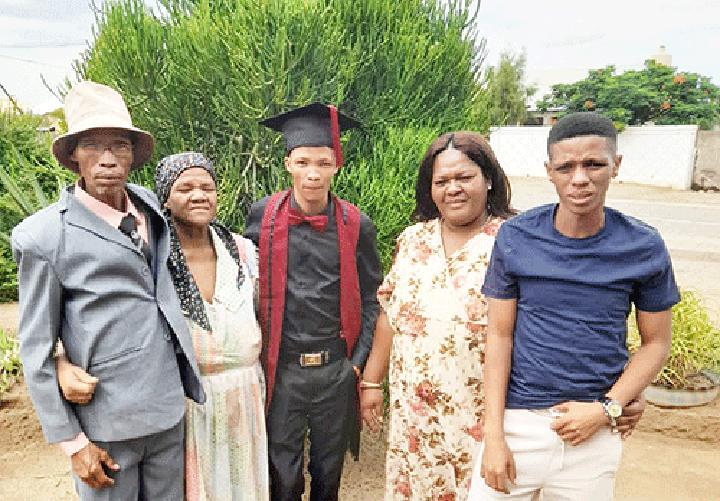Africa-Press – Namibia. San students are increasingly pursuing higher education with aspirations to contribute to their communities.
One such exemplary student is Petrus Askoek, a determined young man hailing from the Tsjaka Ben Hur settlement in the Omaheke region. His dedication to education culminated in the achievement of a Junior Primary Education Diploma from the University of Namibia’s Southern Campus in Keetmanshoop.
The 26-year-old Askoek says his ambition is to complete his schooling and ultimately lead a life dedicated to service.
His educational foundation was laid at Mphe Thuto Primary School (PS) in Tsjaka settlement. He has now returned to the school as a qualified Khoekhoegowab language teacher, imparting his knowledge to Grade 3 pupils.
Askoek was active in his school years and was involved in San cultural activities, in addition to playing football and participating in athletics. He continued his secondary education at Johannes Dohren RC High School, where he completed Grade 12 in 2018.
The nomadic San learners often face unique challenges that can lead to premature departure from the formal education system. These challenges are frequently rooted in cultural pressures, such as the necessity for families to relocate in search of employment opportunities to sustain themselves.
In many instances, the San people engage in temporary labour, which involve tasks such as constructing fences and herding goats and sheep in often demanding terrains. Some also find employment on commercial farms.
This contributes to the unfortunate phenomenon of children discontinuing their schooling without completing their education. Askoek was, however, determined to complete his school career.
“I didn’t focus on what I didn’t have or what other learners have. Plus, I was a bookworm; even my classmates were complaining about it,” Askoek said. He said his studies were paid for by the Office of the Prime Minister (OPM), adding that it was not an easy journey.
“Sometimes, I didn’t have food and toiletries on campus, but I kept pushing. These struggles didn’t make me lose interest in my studies. I sacrificed my time and always remained humble,” he said.
Drawing from his personal experiences, he offered words of encouragement to San youth who may have dropped out of school, urging them to never give up on their dreams, and to persevere in their pursuit of a better future.
“Those who are studying must push themselves, and think of the positive future ahead of them when they complete their studies. Nothing is too late. Push for opportunities in life, let’s rise and grab any opportunity coming our way,” he urged.
He advised that there are specific programmes within the OPM and the gender equality ministry that are specifically designed to support San learners who aspire to further their education at tertiary institutions.
“We must knock on those doors and be assisted with furthering our studies,” he emphasised. Asked why he chose the teaching profession, Askoek said teaching allows him to share knowledge and help others learn.
“I want to inspire, guide and lay a strong foundation for learners in their primary education. Through teaching, you also grow personally and professionally by improving your skills,” the teacher said.
He added that teaching helps build strong connections with others, and can lead to career opportunities.
Furthermore, the Khoekhoegowab language teacher said he is happy to teach at Mphe Thuto PS, the school where he started his education journey.
“This is where I went to school, and I planned to come back here and make a difference where I can. The learners are going through the same things I experienced, and I would like to help these learners.”
Askoek said no matter how tough things may seem, he considers every challenge an opportunity to grow.
“I take it one step at a time, remain humble and focus on my vision by staying away from bad things,” he said.
The 26-year-old teacher plans to further his studies next year.
“The race is still on, and I would like to pursue an honours degree next year,” he said.
Askoek dedicated his achievement to his parents, sisters and his church leaders who have always been there for him with their unconditional love, support and prayers.
“Their encouragement gave me the strength to keep going, even when things were difficult. They believed in me when I doubted myself, and that made all the difference,” he recalled.
He has three younger siblings currently in Grades 1, 3 and 7, while two other siblings unfortunately did not complete their secondary education after failing Grade 10.
Approached for comment, Omaheke Regional Development Planner Desiree Masheshe said there are funding programmes available for all marginalised groups, including the San, Ovatue, Ovatjimba and those in extreme poverty.
“These programmes are aimed at uplifting the living standards of the marginalised. If the marginalised are qualified to go to tertiary institutions, we assist them with all expenses involved,” she said.
The beneficiaries receive financial aid for tuition, hostel fees, toiletries, transportation, stationery and other essentials.
Masheshe said the Omaheke region has the highest number of San learners registered at tertiary institutions, and encouraged those who qualify to further their studies to approach the relevant offices countrywide.
She further said the responsibility for these funding initiatives will now fall under the office of Vice President Lucia Witbooi, marking a transition from the previous oversight by the Ministry of Gender Equality, Poverty Eradication and Social Welfare.
For More News And Analysis About Namibia Follow Africa-Press






